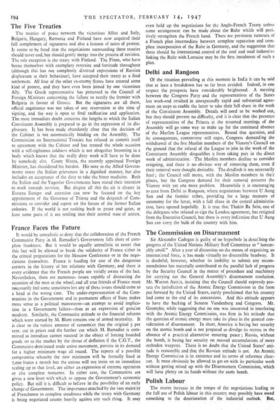France Faces the Future
It would be unrealistic to deny that the collaboration of the French Communist Party in M. Ramadier's Government falls short of com- plete frankness. But it would be equally unrealistic to assert that this fact will be allowed to break the solidarity of France either in the critical preparations for the Moscow Conference or in the nego- tiations themselves. France is heading for one of the dangerous corners in the history of her relations with Germany, and there is every evidence that the French people are vividly aware of the fact. Nevertheless, there are numerous issues capable of distracting the attention of the men at the wheel, and all true friends of France must necessarily feel some uneasiness lest any of these issues should come to a head at the wrong time. The under-representation of the Com- munists in the Government and in permanent offices of State makes more sense as a political manoeuvre—an attempt to avoid implica- tion in a Government failure—than as an expression of genuine modesty. Similarly, the Communist attitude to the financial reforms which were started by M. Blum remains one of armed neutrality. It is clear to the veriest amateur of economics that the original 5 per cent. cut in prices and the further cut which M. Ramadier is com- mitted to introduce cannot succeed in the object of forcing hoarded goods on to the market by the threat of deflation if the C.G.T., the Communist-dominated trade union movement, persists in its demand for a higher minimum wage all round. The reports of a possible compromise whereby the new minimum will be formally fixed at 7,000 francs a month but the unions will not insist on an immediate scaling up to that level, are either an expression of extreme optimism or else complete nonsense. In either case, the Communists are given a new lever with which to oppose the Government's economic policy. But still it is difficult to believe in the possibility of an early change of Government. The importance attached by the vast majority of Frenchmen to complete steadiness while the treaty with Germany is being negotiated counts heavily against any such thing. It may even hold up the negotiations for the Anglo-French Treaty unless some arrangement can be made about the Ruhr whkh will posi- tively strengthen the French hand. There are persistent rumours of a French plan intermediate between complete separation and com- plete incorporation of the Ruhr in Germany, and the suggestion that there should be international control of the coal and steel industries linking the Ruhr with Lorraine may be the first instalment of such a plan.


































 Previous page
Previous page